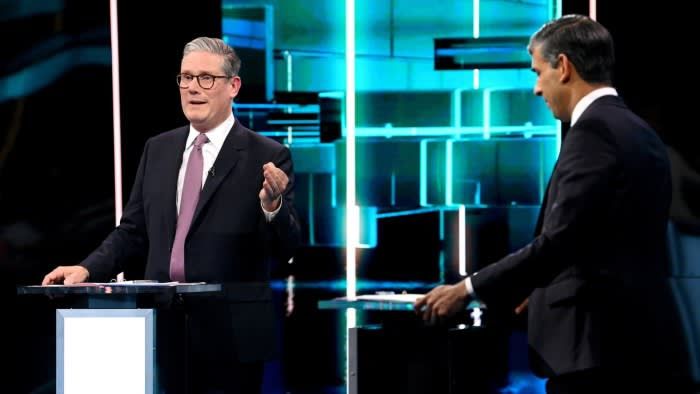A ‘rabbit in the headlights’: Keir Starmer slow on stage to reject Tory £2,000 tax claim

Get access to the Editor's Digest at no cost!
Every week, Roula Khalaf, who is the Editor of the FT, picks out her preferred articles and presents them in a newsletter.
The hour-long debate on Tuesday had gone on for over 50 minutes when Sir Keir Starmer finally put an end to Rishi Sunak’s repeated statement that Labour intended to increase taxes by £2,000 per household.
After the televised debate on ITV, a member of the Conservative Party expressed confusion as to why one participant did not immediately dismiss the topic as absurd. Instead, they appeared shocked and speechless, like a startled rabbit caught in headlights.
What aspect of him failed to comprehend the necessity of straightforwardly refuting the accusation?
When Starmer stated that the assertion was completely ridiculous and total rubbish, the number - which Sunak claimed was derived from unbiased Treasury calculations - had already been solidified as the most memorable phrase of the discussion.
According to Starmer's supporters, the reason he followed a formal approach during the debate was to ensure that he followed the established guidelines and didn't interrupt Sunak or the moderator, Julie Etchingham.
A staff member characterized Starmer as a well-mannered individual who demonstrated respect and did not wish to cut off Etchingham just to score political advantages. Sunak garnered negative ratings for his repeated interruptions of Liz Truss during a leadership debate in 2022.
Since Labour was leading by a considerable margin in the polls before the upcoming July 4th election, Starmer took a more careful approach to his behavior on stage compared to Sunak. Sunak, on the other hand, had less to worry about and was able to put on a more aggressive and lively performance.
According to Anand Menon, the director of the think-tank UK in a Changing Europe, he has been instructed not to interrupt or lose his temper. Despite this, he committed those exact actions. Menon also pointed out that it is undeniably apparent now that Starmer should have responded with more assertiveness to the allegation.
Although Starmer appeared uncertain while on stage, Labour had already obtained a valuable asset. Shortly after the debate had ended, a letter surfaced from James Bowler, the top civil servant at the Treasury, stating that the department was not associated with the £2,000 amount.
Labour's Darren Jones received the letter on Monday, providing sufficient time for it to be a part of Starmer's thorough planning for the upcoming debate.
If Starmer had presented the letter or at the very least referenced it, it could have destroyed Sunak's primary line of attack and caused the prime minister to experience significant embarrassment live on air. This could have become the standout moment of the debate.
A member of the Labour party stated that there might be a small investigation on why Keir did not possess that information.
Although it took him a while to end the conversation, quick surveys on the debate between the two leaders showed that they were almost tied. According to an early YouGov poll, the Conservative leader was slightly ahead of his Labour opponent with a 51/49 score. However, another survey by Savanta showed that Starmer was leading with a score of 44 to 39. The third and final assessment by JLP revealed that Starmer was ahead with a significant score of 53/33 against Sunak.
According to Lord Peter Mandelson, who used to be a cabinet minister for the Labour party, Starmer's main aim for the debate was to present himself in a way that looked like a potential prime minister. He also wanted to steer clear of engaging in a heated argument with Sunak.
According to an aide of Starmer, he was demonstrating a high level of respect for the conditions of the discussion. Unlike the Prime Minister, he was not interested in jumping up and down, screaming, and disrupting the moderator. He had the intention to calmly lay out the fact that we have absolute trust in our plans.
Starmer is facing a more significant challenge: does his reluctance to speak out during his appearance on Tuesday indicate that he lacks the ruthless drive necessary as a future prime minister? This weakness could potentially hinder his performance in office.
According to Menon from the UK in a Changing Europe organization, Starmer lacks the quick and skilled verbal abilities that previous prime ministers Tony Blair and David Cameron possessed. Blair and Cameron were highly accomplished speakers in public settings.
We can't say for sure whether he's indecisive until he's put to the test during a government crisis.









































